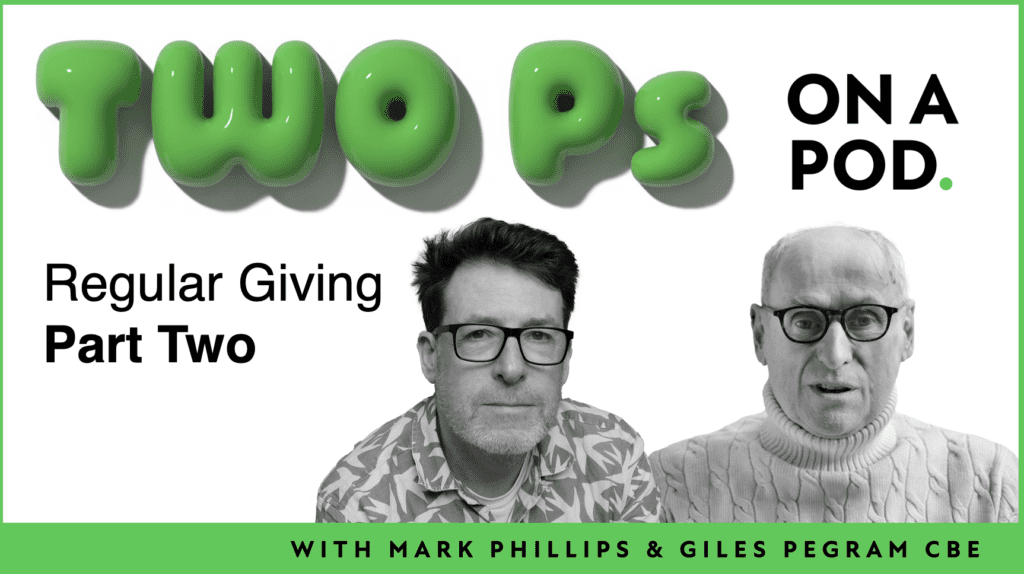Five things we can learn about fundraising from DJ David Rodigan
If you saw David Rodigan walking down the street, you might imagine he was a bank manager or an accountant. He's a bespectacled 59 year-old who hasn't got much hair left, but see him on stage with a couple of turntables and you'll start to understand why he's lasted so long in a business that that always seems to be looking for the next new thing.
So what can we, in the fundraising world, learn from him?
Here are five things about his approach that I think makes him different - and successful. All of which are demonstrated in a 1 minute 21 second video clip (recorded late last year by @misterkoop in a club just around the corner from the Bluefrog offices).
1. He concentrates on delivering just what his audience wants
We all have favourite parts of a record and can't wait until we get to 'the good bit'.
As you'll see, if there's something that the crowd likes, David simply rewinds and plays it again and again and again. He gives his 'customers' just what they want - as many times as they want.
It's the same for fundraising. When we communicate, we should do the hard work and make sure we give our donors what they want – over and over again. Donors tell us that what matters to them is knowing what impact their gifts have had.
But too many charities talk generally about their work. They make donors fish through brochures, websites or mailing packs for the few gems of information that provide them with what they are looking for.
2. He's passionate
David doesn't hide behind the decks like most DJs. He runs around and spends time at the front of the stage dancing and singing. He shows his audience that he's just like them and loves the music as much as they do.
As a result, they get to know him as a person.
As fundraisers, we shouldn't hide our passion beneath formal language and corporate style brands. We should share it with our donors. Our role is not to be balanced. Our role is to be like our donors and champion the causes we care about.
3. He knows his audience wants to be part of his show
As you watch the video, you'll see that the volume is turned up and down giving the audience the chance to join in.
Donors are the same. Few want to be passive cheque signers. A surprising number want to have a chance to show they are part of your organisation.
A short while ago we offered donors to one charity a selection of devices they could use to demonstrate they were part of the organisation. Over 90% of responders donors requested one.
4. He shares
Throughout his show, David tells you the name of the track he's playing or shares short stories about when he first heard a song. Sometimes he holds up a vinyl 12-inch record sleeve to demonstrate that he's bringing you the original version.
Some DJs don't like people to know the names of the tracks they are playing. I've seen people go as far as sticking white paper over a label so others can't 'copy' them. Not David. After a show, you've got the names of some new singers or bands to go and listen to.
It's the same for charities. One of the reasons why I write this blog is to share good and bad ideas so fundraisers will have a better idea of what is worth copying and what isn't. If you've tested an idea that has failed, be brave and let other charities know (you can do a guest post here if you'd like). As a sector we are pretty good at this, but I still see too many examples of organisations copying 'bad' ideas and paying the price.
5. He asks his audience what they think
Throughout the show David asks for 'signal' about different records. In short, he's asking people if they like what he's playing. If it's a big yes, they get some more. If it's not so big, maybe the record won't get played as often or for as long. He's constantly keeping an eye on what works for his audience and responding.
As fundraisers we should be constantly assessing our appeals and judging whether we are pleasing donors. Our biggest signal is more income. Donors tend to vote with their cheques and credit cards. The more money we raise, the more we have pleased our donors.
But they can let us know what they want in other ways too. Whether it's formal surveys or analysing the one-on-one conversations that staff have with donors, we should never stop listening.
And then we should test whether other donors might like the idea too. A few vocal individuals (or staff) might not be representative of your whole supporter base. David learns from the crowd as much as from individuals. We should do the same.
Tags In
The Essentials

Crack the Code to Regular Giving: Insights, Strategies, and a Special Giveaway!

‘Tis Halloween. Keep to the light and beware the Four Fundraisers of the Apocalypse!

Why do people give? The Donor Participation Project with Louis Diez.

A guide to fundraising on the back of a postcard

What does the latest research tell us about the state of fundraising?





